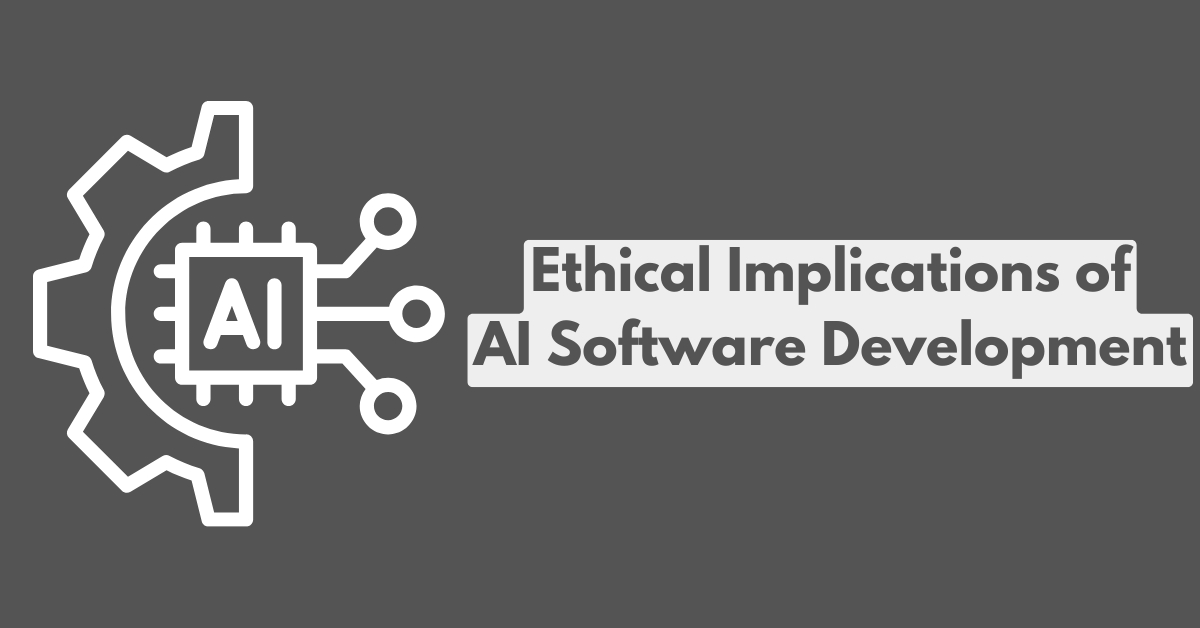Artificial Intelligence (AI) is becoming increasingly prevalent in software applications across various industries. From customer service chatbots to complex data analysis tools, AI is reshaping the way businesses operate and interact with customers. While these advancements bring numerous benefits, they also introduce a set of ethical challenges that need careful consideration.
AI-powered software applications can enhance efficiency, decision-making, and customer experience. However, with this power comes the responsibility to ensure that these systems operate fairly, transparently, and securely. Businesses that overlook ethical considerations in their AI systems risk not only regulatory penalties but also damage to their reputation and loss of customer trust.
In this blog, we will explore the ethical challenges that arise with AI in software applications and provide insights into how businesses can address them. The focus will be on ensuring that AI systems contribute to positive societal impact while maintaining business integrity.
Ethical Challenges in AI-Powered Software Applications
As AI continues to evolve and integrate into software applications, businesses must consider the ethical implications that come with it. AI technologies have the potential to revolutionize industries and improve various aspects of operations, but they also present a unique set of challenges. Ethical concerns in AI can directly affect the fairness, transparency, and privacy of the systems in which they are implemented. Businesses that fail to address these ethical issues risk not only regulatory backlash but also reputational damage that can result in a loss of customer trust.
Bias and Discrimination in AI Systems
AI systems are only as good as the data they are trained on. When the data used to train AI models is biased or incomplete, the software may reflect and even perpetuate those biases. These biases can result in unfair decision-making that disproportionately affects certain groups, particularly those based on gender, race, or socioeconomic background. For instance, AI-powered recruitment tools may inadvertently favor one demographic over another if the historical data reflects such biases.
Such biased AI systems are not only ethically problematic but can also create significant legal and business risks. Discriminatory practices could lead to lawsuits, loss of reputation, and a decline in customer confidence. Ensuring fairness and avoiding discrimination in AI systems requires careful attention to the data used and continuous monitoring for potential biases. It is crucial for businesses to actively work toward building more equitable AI systems to prevent perpetuating harmful societal biases.
Lack of Transparency in AI Decision-Making
AI decision-making processes are often described as "black boxes." This means that the rationale behind the decisions made by AI systems is not easily understood by humans. Without transparency, it becomes difficult for users or stakeholders to trust the AI's decisions. In some cases, this lack of explainability can be particularly problematic in high-stakes areas like healthcare, finance, or law enforcement, where AI systems may make decisions that significantly impact people's lives.
For businesses, the lack of transparency in AI can lead to public distrust, regulatory scrutiny, and difficulty in justifying AI-driven decisions to stakeholders. To address this, it is important to implement AI systems that allow for greater transparency, where users can understand how decisions are made and why certain outcomes were chosen. Clear explanations and accessible audit trails are essential for building confidence and ensuring that AI systems are being used responsibly.
Data Privacy and Security in AI Systems
Data is at the core of AI-powered applications. However, as AI systems gather, process, and analyze large amounts of data, concerns around privacy and security emerge. AI models often require vast amounts of personal information to function effectively, from user preferences to sensitive medical or financial data. Without proper safeguards, these systems could expose individuals to data breaches, misuse, or unauthorized access.
Protecting the privacy of users while ensuring AI systems are secure is an essential ethical consideration. Businesses must adopt robust data protection measures, including encryption, anonymization, and compliance with global data privacy laws like GDPR. The ethical handling of data not only helps businesses stay compliant with legal requirements but also builds trust with users, ensuring their personal information is handled responsibly and securely.
Accountability and Liability in AI Decisions
As AI systems become more autonomous, determining accountability and liability for their decisions becomes increasingly complex. When an AI-powered application makes an error or causes harm, it can be unclear who is responsible—the developer, the user, or the AI system itself. This lack of clarity creates significant ethical and legal challenges, especially when decisions impact people's lives or businesses.
For businesses, it is crucial to establish clear guidelines on accountability when implementing AI systems. This includes defining who is responsible for the actions of AI models, setting clear parameters for their use, and ensuring human oversight in critical decision-making processes. By maintaining accountability, businesses can mitigate risks and ensure that AI systems are being used ethically and with due diligence.
Key Ethical Principles for AI in Software Applications
When developing AI-powered software applications, it is essential to establish a strong foundation of ethical principles that guide decision-making processes. These principles help ensure that AI systems are not only effective but also aligned with social values, fairness, and accountability. Implementing these ethical principles can lead to AI systems that are trustworthy, transparent, and beneficial to all stakeholders involved.
Fairness in AI Systems
Fairness is a cornerstone of ethical AI. An AI system should treat all users and stakeholders equally, avoiding biases that may disadvantage certain groups based on characteristics like race, gender, or economic status. The challenge lies in ensuring that the algorithms and data used in AI systems do not inadvertently reinforce societal inequalities. By ensuring fairness, businesses can create AI systems that are more inclusive and avoid perpetuating harmful stereotypes.
To achieve fairness, businesses must prioritize diversity in the datasets used to train AI models. This includes sourcing data from various demographic groups to avoid biases. Additionally, fairness can be ensured by regularly auditing AI models to check for any unfair outcomes. A commitment to fairness not only promotes ethical behavior but also helps businesses avoid legal issues related to discrimination.
Transparency and Explainability in AI Decisions
Transparency and explainability are essential for creating AI systems that users and stakeholders can trust. Transparency involves providing clear insights into how an AI system works, while explainability ensures that the decisions made by AI systems can be understood by humans. When AI systems are used to make important decisions, such as loan approvals or medical diagnoses, stakeholders must have access to understandable explanations of why certain decisions were made.
By prioritizing transparency and explainability, businesses can prevent the "black-box" nature of AI that leads to mistrust and uncertainty. Users need to feel confident that AI decisions are based on rational, explainable processes. Ensuring that AI systems are transparent and their decisions explainable also allows businesses to comply with regulations that demand accountability for AI-driven outcomes.
Privacy in AI Systems
Privacy is a critical ethical consideration in AI, especially given that AI systems often rely on large volumes of personal data. Businesses must ensure that AI systems handle this data responsibly by prioritizing user privacy and complying with relevant data protection regulations. Proper data encryption, anonymization, and consent processes are vital for safeguarding user information.
By addressing privacy concerns, businesses can build trust with their users and avoid potential data breaches or misuse of personal information. Transparent data handling policies also give customers the confidence that their information is safe and used only for its intended purpose.
Accountability in AI Systems
As AI becomes more autonomous, defining accountability in the context of AI systems is becoming increasingly complex. Businesses must ensure that clear responsibility is established for AI-driven decisions. This involves not only determining who is accountable when things go wrong but also setting up clear guidelines for overseeing AI behavior and correcting any mistakes.
Accountability is essential for maintaining ethical standards and ensuring that AI systems are used responsibly. By clearly outlining who is responsible for the development, deployment, and actions of AI systems, businesses can minimize risks and hold themselves accountable to their users and the broader community.
How Can Businesses Address Ethical Considerations in AI?
To build and maintain ethical AI-powered applications, businesses must actively implement strategies that address the key challenges associated with AI technologies. This includes embedding ethical considerations into every stage of AI development, from initial planning to ongoing monitoring after deployment. By taking proactive steps to ensure ethical AI practices, businesses can safeguard their reputation, foster user trust, and contribute positively to society.
Incorporating Ethical Guidelines into AI Development
One of the first steps in addressing ethical considerations is to establish clear ethical guidelines for AI development. These guidelines should outline the principles that the business adheres to, including fairness, transparency, privacy, and accountability. By setting these standards early on, businesses can ensure that AI systems are developed in a manner that aligns with their values and complies with regulatory requirements.
These ethical guidelines should also extend to the development team, ensuring that all stakeholders involved in the creation of AI systems understand and prioritize ethical practices. Regular training and awareness programs can help maintain this focus on ethics throughout the development process.
Ensuring Diverse and Representative Data
The quality of the data used to train AI models plays a critical role in determining how fair and unbiased the system will be. Businesses must ensure that the data used is diverse and representative of all potential users. This includes gathering data from various demographic groups and ensuring that the dataset reflects different social, cultural, and economic backgrounds.
By using diverse data sets, businesses can reduce the risk of bias and discrimination in AI systems, ensuring that decisions made by AI are more inclusive and equitable. Regularly auditing datasets and addressing any potential biases also helps maintain the integrity of AI systems over time.
Regular Audits and Ethical Reviews
Ethical AI practices cannot be maintained with a one-time review. Businesses should conduct regular audits and ethical reviews of AI systems to ensure they continue to operate in alignment with established ethical guidelines. This includes assessing the performance of AI systems for fairness, transparency, and accuracy. Regular evaluations also help identify and correct biases or unethical behaviors that may have emerged over time.
By establishing a process for continuous auditing, businesses can stay ahead of potential ethical issues and ensure that their AI systems remain responsible and aligned with their values.
Engage with Experts
Businesses should also engage with external experts to ensure their AI systems meet the highest ethical standards. This can include collaborating with ethicists, legal professionals, data scientists, and AI specialists who can provide critical insights and guidance. Expert reviews can help businesses identify areas of concern that may not be immediately apparent and offer solutions to address them.
By involving experts, businesses can ensure that their AI systems are developed and deployed with a comprehensive understanding of the ethical implications. Expert engagement also fosters a culture of transparency and accountability, making it easier for businesses to navigate complex ethical landscapes.
The Importance of Ethical AI for Business Success
Adopting ethical practices in AI-powered software applications is not only a moral obligation but also a strategic business move. In today’s highly competitive and transparent marketplace, customers, regulators, and stakeholders are increasingly concerned with how AI systems impact fairness, privacy, and overall societal well-being. Integrating ethical AI practices provides numerous benefits that contribute to long-term business success, from building trust to ensuring regulatory compliance and improving operational performance.
Building Trust with Users
Trust is one of the most valuable assets for any business, especially when deploying AI systems that directly affect customer experiences. Ethical AI practices help businesses foster trust by ensuring that their AI systems are transparent, fair, and respectful of user privacy. When users feel confident that their data is handled responsibly and that the AI systems they interact with are unbiased and accountable, they are more likely to engage with and remain loyal to the business.
Ethical AI not only protects customers but also cultivates a reputation for being a company that values integrity. This reputation can be a significant competitive advantage, especially as customers are becoming more discerning about how companies use their data and make decisions on their behalf.
Staying Ahead of Regulations
As AI continues to evolve, governments around the world are implementing more stringent regulations regarding AI use, data privacy, and algorithmic accountability. For example, the European Union's General Data Protection Regulation (GDPR) and the proposed AI Act set clear guidelines for businesses regarding the ethical deployment of AI. By adopting ethical AI practices, businesses can stay ahead of these evolving regulations and avoid potential legal challenges, penalties, and fines.
Compliance with AI-related regulations not only helps businesses avoid costly mistakes but also demonstrates to stakeholders that they are committed to operating responsibly. Proactively addressing ethical concerns in AI can make businesses better equipped to meet emerging regulatory demands and maintain their standing in the market.
Improving Operational Performance
Ethical AI practices lead to better outcomes for both businesses and their users. When AI systems are developed and regularly reviewed for fairness, transparency, and bias, they perform more accurately and reliably. By identifying and addressing ethical issues, businesses can improve the quality and effectiveness of their AI systems, resulting in better decisions, reduced errors, and more efficient operations.
Furthermore, ensuring that AI models are built with diverse and representative data increases the chances of generating more accurate and inclusive outcomes. Ethical AI practices, such as ongoing audits and expert engagement, help optimize AI performance while reducing the likelihood of costly mistakes or reputational damage.
Conclusion
Ethical considerations are crucial for businesses leveraging AI-powered software applications. Ensuring fairness, transparency, and privacy not only builds trust with users but also helps comply with evolving regulations and enhances operational efficiency. Ethical AI practices allow businesses to maintain a competitive edge while fostering responsible technology use. For businesses looking to create AI systems that align with these values, collaborating with software development companies can ensure that ethical guidelines are integrated from the start, driving long-term success.



